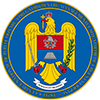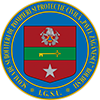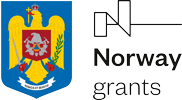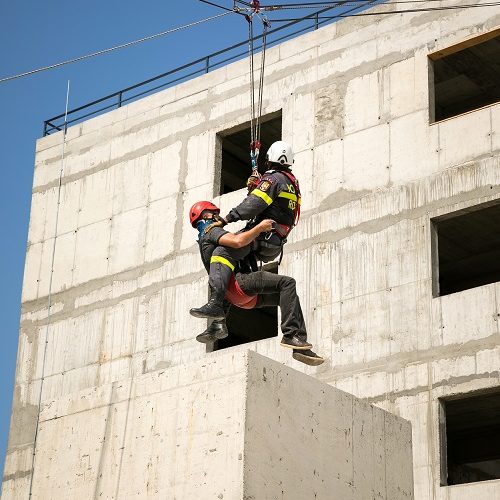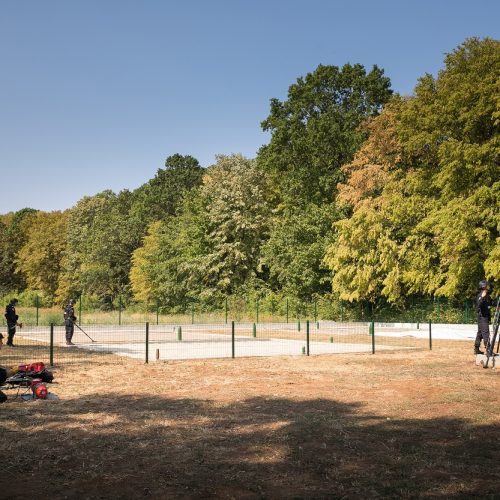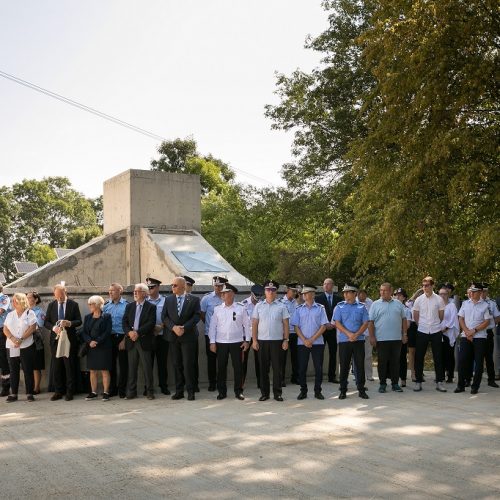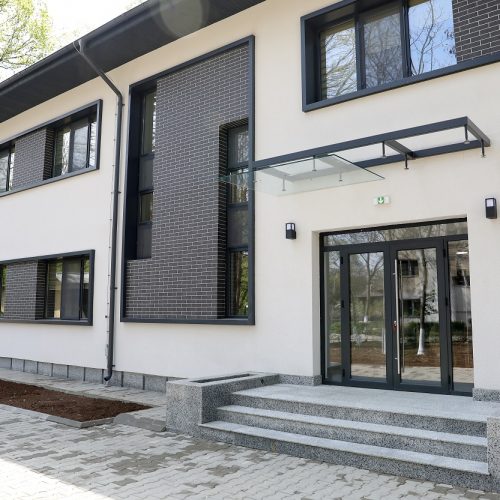

Improving disaster risk resilience by enhanced preparedness for search and rescue and bomb removal missions - RESILIENCE
Partners
Until 2004, civil protection and firefighting measures were carried out by the General Inspectorate of the Military Fire Brigade and the Civil Protection Command, institutions under the coordination of the Ministry of Interior.
In order to adapt to the exponential growth of non-military risks, amid accelerating globalization trends, radical climate change, diversification of economic activities and disaster production, the two institutions merged in December 2004, thus establishing the General Inspectorate for Emergency Situations. (IGSU).
The fundamental objective of IGSU’s work is to streamline emergency prevention and management in order to maintain control of risks and ensure the normality of life of human communities and is achieved through a wide range of fire prevention and response activities, release and first aid SMURD, rescue of people and limitation of damage caused by floods, landslides, seismic movements, epidemics, epizootics, snowfall, drought, assistance to people in critical situations, intervention in technological, radiological, nuclear, biological or other accidents types of natural or man-made disasters.
The General Inspectorate and the territorial structures are composed of 42 operational centres and over 280 operational subunits.
The necessary staff is provided by the dedicated training institutions: “Alexandru Ioan Cuza” Police Academy Bucharest – Faculty of Fire and Non-Commissioned Officers of Fire and Civil Protection “Pavel Zăgănescu” Boldești.
As an integrator of the National Emergency Management System, created in 2004, IGSU coordinates the actions of institutions involved in emergency management, ensuring the function of national contact point in relation to international governmental and non-governmental organizations with responsibilities in the field.
Organization
DSB has just under 700 employees. Of these, approximately 300 are at the head office in Tønsberg. The other employees work in the department for emergency and emergency communications in Oslo and Moss, the supervisory regions for electricity supervision, the Norwegian Fire Academy, the National Education Centre for Civil Protection and Emergency Planning, the civil defence districts and at the Civil defence’s emergency and competence centre.
DSB’s responsibilities
– National, regional and local security and emergency preparedness,
– Fire and electrical safety,
– Industrial and business security,
– Dangerous substances and transport of dangerous goods,
– Critical telecommunications infrastructure for emergency and emergency services,
– Product and consumer safety,
– Offer operational support during crises within coordination, reinforcement and professional advice
– Follow up Norwegian interests and obligations in work in the field of social security with international organizations such as the EU, UN and NATO Agency management of the Civil Defense
Furthermore, DSB has an administrative responsibility for some laws and associated regulations:
– The Fire and Explosion Protection Act
– The Electricity Regulatory Act
– The Product Control Act
– The Civil Protection Act
In addition, the Planning and Building Act and regulations provide strong guidelines for the directorate’s assignments.
DSB shall also, according to instructions for the ministries’ work with social security, support the ministry’s coordinating role within social security and emergency preparedness, and lay the foundation for good and comprehensive preventive work and good emergency preparedness within public administration and socially critical activities.
DSB is responsible for ensuring that important societal functions have access to a safe, robust and timely communication system for management and interaction in daily work and in the event of major incidents. The Directorate owns Nødnett and is responsible for its management and further development in line with the users’ needs.
DSB’s roles
Directorates can have several roles; professional adviser, implementer of adopted policy, administrator of legislation, telecommunications operator and practitioner of agency management:
The professional role includes being a professional adviser to the Ministry of Justice and Emergency Preparedness and being a competence body for the justice and emergency preparedness sector, other public bodies, voluntary organizations, business and the population. The professional role means that DSB is responsible for monitoring conditions that affect society’s preparedness, and for compiling knowledge and experiences and acting as a national standard setter in our field of work.
The implementing role includes ongoing implementation of adopted policies – on behalf of the government and the Storting. This can, for example, be to implement action plans and campaigns, or provide grants in line with the objectives set by the Storting.
The administrative role means that DSB, through delegation from the ministry and through directly assigned authority, manages legislation within our area. We shall provide information and guidance on the regulations, supervise, process individual cases where authority has been assigned or delegated, be an appeals body in certain areas, issue regulations where we have been given authority to do so and, based on our experience, communicate any need for legislative changes to the ministry.
Agency management includes managing, organizing and developing underlying / external agencies.
As a telecommunications operator, DSB is the owner and manager of Nødnett. We will have a sector-wide perspective with emphasis on Nødnett as a critical infrastructure, and contribute to the necessary coordination and competence transfer between and with the users of Nødnett. DSB shall facilitate that Nødnett is used actively in the daily and during crises, and that everyone who has an emergency and emergency preparedness responsibility can become users of Nødnett. We will ensure that Nødnett has good availability and stable, safe and cost-effective operation. We will follow up that the users’ emergency network equipment has stable and secure operational support services, and that training of end users ensures the correct use of the Emergency Network.
Pavel Zăgănescu” Non-commissioned Officers School of Firefighting and Civil Protection, Boldeşti is a post-secondary military education unit within the structure of the Ministry of Internal Affairs, being directly subordinated to the General Inspectorate for Emergency Situations.
“Pavel Zăgănescu” Non-commissioned Officers School of Firefighting and Civil Protection, Boldeşti conducts professional training activities in the field of emergency situations management through:
• Initial training that provides the aquisition of the professional skills for the professions of the firefighting and civil protection non-commissioned officer and of the foreman.
• Continuous training of the General Inspectorate of Emergency Situations/Ministry of Internal Affairs staff in the formal and nonformal contexts in the emergency situations magement field of activity, based on the professional training standards in order to acquire and develop the neccessary professional skills used in the workfield, as well as for the development of the military career.
The process of INITIAL TRAINING conducted by school ensures an organized and structured learning within an institutionalized framework based on an explicit didactic design with pre-established educational aims expressed in knowledge or skills acquired, that are institutionally certified.
“Pavel Zăgănescu” Non-commissioned Officers School of Firefighting and Civil Protection, Boldeşti is an integral part of the national system of state education and it is unique on national level by ensuring the acquisition of level 5 -professional skills within the military post-secondary education programs for the professions of the firefighting and civil protection non-commissioned officer and of the foreman “based on the curricula associated with the standards of professional training, approved by the Ministry of Internal Affairs and certified by the Ministry of National Education.
After it was assessed by a national commission from the Ministry of National Education, at present the institution holds a “Certificate regarding the level of quality of education offered “, for the post-secondary level, in accordance with the performance indicators from the evaluated reference standards (quality standards)” for level of education 5 (post-secondary military education).
There are three training departments in the school: the Specialised Training Department, the Technical Auto Field Training Department, the Social Sciences, Information Technology and Physical Education Department and there is also a First Aid and Extrication Center.
The Specialised Training Department ensures the acquisition of the competences regarding the integrated system of specific technical-organizational measures, planned for the prevention or elimination of the potential risks generating emergency situations, the acquisition of the professional competences regarding the planning, organization, deployment, management and assessment of the incidents in emergency situations, the formation and improvement of the psycho-pedagogical and methodical skills necessary for organizing, managing and carrying out the topics of continuous training of the personnel.
The Technical -Auto Field Training Department ensures the theoretical and practical activities in order to get the driving licence for the C category, the acquisition of the competences regarding the maintenance and use of the fire appliances.
The institutional missions in the field of emergency situations management determine the personnel training regarding the protection of citizens’ lives, of the public and private property, of the environment, of citizens’ rights, professional cooperation in order to diminish the effects of some calamities, disasters, accidents, solving professionally and as soon as possible requests of citizens / institutions, in compliance with ethical norms, improvement and efficiency of incidents, risk monitoring and analysis, planning and use of resources available at the incidents.
The fulfillment of the professional duties involves not only applying the specialized knowledge and the specific procedures, but also the capacity of communication, teamwork, adapting to the specific professional environment and to unpredictable situations, problem solving ablity, working in international context, moral conduct, positive attitudes towards diversity and multiculturality, seeking-success attitude, use of multiple sources of information, decision-making ability, emotional intelligence, awareness of a lifelong learning process.
Thus, the school is in a permanent process of transformation, modernization and improvement, both from a managerial, but also from a functional point of view, with a consistent aim of improving the study programs, of increasing the quality of the educational services and the degree of training of the personnel.
The Romanian Gendarmerie is a structure of the Ministry of Internal Affairs and one of the most important law enforcement institutions in Romania. At national level, its entire activity is planned, organized, managed, coordinated and supervised by the General Inspectorate of Romanian Gendarmerie, which is the central unit.
Full rights member within International Association of Gendarmeries and Police Forces with Military Status (FIEP) since 2002, within European Gendarmerie Force (EUROGENDFOR) since 2008 and within European network of antiterrorist forces (ATLAS) since 2011, the Romanian Gendarmerie represents the State force placed at the service of the law and the citizens, of the security and the international commitments assumed by Romania, able to intervene in the most complex operational environments.
The institution has a strong experience in training on crowd control at European level through the participation as consortium member and partner to the Training Exercises for the European Police Force – funded through the European AGIS Program (2003-2007), to the trainings within European Union Police Forces Training – EUPFT (2008-2010), European Union Police Services Training – EUPST I (2011-2013) and EUPST II (2015-2018), funded through the European Instrument for Stability and Instrument Contributing to Stability and Peace.
The Romanian Gendarmerie is responsible across the entire national territory for all crowd control missions during mass gatherings as meetings, public manifestations, sportive, cultural, memorial and religious activities, for restoring public order when it has been disturbed and also for preventing and fighting against crime and terrorist acts.
Beside these responsibilities, according to the provisions of the Law no 550/2004 on the organizing and functioning of the Romanian Gendarmerie, through its specialized structures, it performs missions in the following areas of interest:
– protecting of life, corporal integrity and freedom of persons, public and private property, citizens, community and State legitimate interests;
– assuring and re-establishing of public order at State cross-border checking points;
– preventing and crimes detection within mountain resorts and tourist routes, as well as on the Black Sea coast, in the Danube Delta, in resorts or in other operational interest areas;
– maintaining of public order during the official visits or during other activities to which Romanian or foreign high officials take part, on Romanian territory, in the objectives’ area and in the places where the activities are carried out;
– participating in anti-terrorist intervention missions in the objectives under the Gendarmerie responsibility or in missions for capturing and neutralizing persons using fire arms or other means that put into danger the safety of persons, goods, values and special transports;
– guarding and protection of certain objectives, goods and other valuable assets, important values transport, as well as fire arms, ammunition, explosive materials, drugs, toxic, radioactive and other dangerous substances transport;
– preventing and neutralizing terrorist acts missions on the Romanian territory;
– surveillance, control and protection of the wild animals fit for hunting and natural fishing funds, the forest and environment;
– limiting and eliminating the natural, technological, environmental or complex disaster consequence;
– ensuring the measures for order and protection of the areas where there were produced or exists the danger of breaking out fires, explosions or some other emergency situations which can threat life, physical integrity of individuals or their goods.
During emergency situations, the Romanian Gendarmerie continues to accomplish its specific missions, in the same time ensuring the respect of the provisions of the military ordinances mentioned in the decree concerning these situations.
Also, according to the Government Decision no. 557/2016 regarding the management of risk types in order to save people during and immediately after an emergency, an important role of the Romanian Gendarmerie is that it has the jurisdiction and capabilities that integrate and coordinate the actions undertaken to ensure the risk types management, implicitly prevention, aimed at identifying, evaluating and reducing the risks of emergency situations in order to protect life, the environment and goods from their negative effects, as well as training, on all the measures and pre-actions included in the preventive and response activities of a permanent nature.
In this context, based on Order no. 181 of August 12, 2010 for the approval of the Regulation regarding the management of emergency situations specific to the types of risk allocated to the Ministry of Internal Affairs, to perform the support functions during the management of emergency situations, IGJR and the subordinated structures execute the following types of missions:
a) establishes and communicates through staff in service the first data and information on the effects of emergency situations affecting the area of competence;
b) informs, notifies and alerts the competent structures about the possibility of occurrence of conflicting situations that may lead to disruption of public order;
c) participates, when the situation so requires, in actions of searching and rescuing of captives in hostile environments or declared missing;
d) monitors specific hazards and risks as well as their adverse effects;
e) ensures the security of the large audience areas in which actions are taking place;
f) secures and monitors affected / evacuated areas;
g) participates, when needed, to the transport of certain categories of forces and means of intervention, evacuated persons and other resources, as well as the distribution of water and food for affected and evacuated persons and animals;
h) provides measures for public order and protection in areas where the imminent danger of emergency situations has occurred or is imminent and restores public order in the affected area and in its immediate vicinity.
The National Centre for Training Improvement for Emergency Situations Management, hereinafter referred to as the National Center, was established on 15.12.2004, based on the Romanian Government Decision no. 1490 of 09.09.2004 and the Order of the Minister of Administration and Interior no. I / 0621 of 01.12.2004. The National Center is a professional training institution from the system of continuous training of the personnel under the direct subordination of the General Inspectorate for Emergency Situations, destined to ensure the improvement of the training of its personnel, of the high civil servants and of the civilian personnel with attributions in the field of emergency management from localities, public institutions and economic operators with majority state capital, with responsibilities in the field of emergency management.
Reported to the training needs of officers and non-commissioned officers from operative structures of General Inspectorate for Emergency Situations, as well as those who did not attend an initial training course in an educational institution, the National Center provides the necessary training and initial training, according to the training needs of the personnel from the National Emergency Management System, the Ministry of Internal Affairs, as well as the institutions belonging to the Defense, Public Order and National Security System. The general objective is to improve the training, specialization, deepening of the knowledge and skills of the personnel of the Ministry of Internal Affairs in order to carry out in optimal conditions the missions that are within the framework of the management and coordination of emergency interventions.
Thus, within the National Centre for Training Improvement for Emergency Situations Management, the initial training courses necessary for the training and specialization needs of the personnel from the intervention structures specialized on types of risk, as well as training courses, attested by qualification certificates recognized at national level, of the personnel from the Central and Local Public Administration, within the Voluntary / Private Services for Emergency Situations of the economic operators and public institutions, as well as of other personnel categories.
The general objectives set at the institution level:
– institutional development by adapting the society’s requirements in the field of emergency situations;
– modernization and development of the infrastructure of the Center to support an efficient educational process.
– amplification of the interinstitutional collaboration on the internal level, in order to implement the modern practices of fire prevention and extinguishing;
– maintaining and improving the quality management system in education, to ensure competitiveness and performance to the standards requested by the beneficiaries;
– improving the documentation / didactic research activity, by carrying out projects that meet the needs of the operational structures within the
Ministry of Internal Affairs;
The educational process offers three levels of interest depending on the specific attributions of the participants in the forms of preparation:
– prefects, sub-prefects and government inspectors;
– Heads of Voluntary / Private Services for Emergency Situations, civil protection inspectors and technical personnel with responsibilities in the field of defense against fires in the public administration, institutions and economic operators that carry out specific activities in the area of competence, by types of risk generating situations emergency;
– operative personnel from the subordinated structures MAI, MApN, SRI etc., who carry out their activity in the field of emergency situations management by types of risk and training of specialists in the fields: CBRN, pyrotechnics, search-urban rescue, rescue from hostile environments, extinction fire, etc.
– cadres of the General Inspectorate for Emergency Situations – non-commissioned officers / officers from external source.
The National Center has the following main attributions:
– ensures the necessary training of military personnel in order to achieve the management
career;
– performs the initial training of officers and non-commissioned officers in the emergency inspectorates;
– ensures the specialization of officers and non-commissioned officers through specialized courses in urban search-rescue, pyrotechnics, C.B.R.N .;
– organizes and conducts the courses and examinations to award the next degree for officers, military masters and non-commissioned officers, in accordance with the legislation in force;
– contributes to the accomplishment of the scientific and applied research, to the elaboration and promotion of new procedures, specific regulations, experimentation of new procedures and devices of action, technical means, materials and equipment for the endowment, etc .;
– issue studies papers, professional certificates, authorizations provided by the legislation in force for the personnel who graduate of the courses taken;
– elaborates education plans, analytical programs, lessons, courses and exercises.
Special Intervention Unit for Emergency Situations (U.S.I.S.U.) is subordinated to the General Inspectorate for Emergency Situations (IGSU), under the Ministry of Internal Affairs of Romania (MAI) and has national territorial jurisdiction.
U.S.I.S.U. is a permanently available standby unit and is composed by: command staff, human resources, medical, logistic & financial structures and three (3) intervention specialized detachments, respectively:
1.SEARCH AND RESCUE DETACHMENT (RO- USAR)
In 2014 RO-USAR was classifed according to the INSARAG Guidelines as a medium – team and in 2019 RO-USAR was reclassifed as a medium – team.
The Romanian USAR Team (RO-USAR) main tasks are:
– Recon and assessment of affected areas;
– Area confinement;
– Search (basic, canine, video, acoustic) and rescue;
– Height rescue;
– On-site first aid and basic medical triage;
-Evacuation;
-Cooperation with all the complementary forces in re-establishing the normal course of action.
2. PYROTECHNIC DETACHMENT
– Search for unexploded ordnance;
– Ordnance identification and classification;
– On-site neutralization for unstable ordinance;
– Transport to storage facility;
– Defusing and/or neutralization;
– Where unexploded ordnance is found, provide free of charge detection and transport services from construction sites, on a “112 call” basis.
3. CBRN DETACHMENT
Recon of possible contaminated area;
– Risk factors classification and contaminated area confinement;
– Existing risks quantification and measures to mitigate effects upon population and environment;
– Setting up a decontamination point for personnel, means and land;
– Decontamination of access paths to and from the affected area;
-Employment of prophylactic and decontamination substances;
– Decontamination of population and own personnel;
– Decontamination of means and land.




